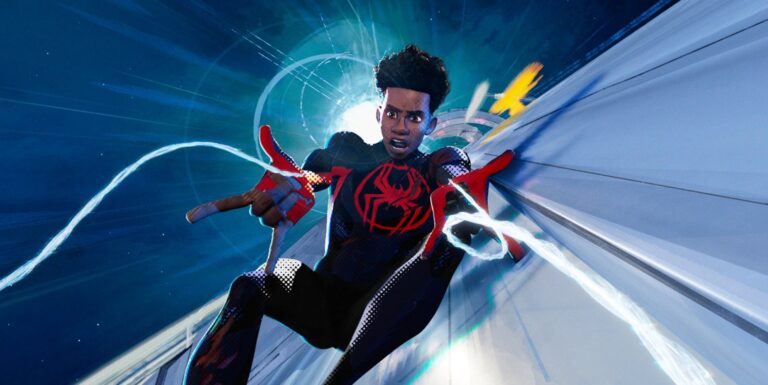Spider-Man: Into the Spider-Verse is widely regarded not only as one of the best Spider-Man films, but also one of the greatest superhero films of all time. Those are mighty big shoes to fill for a sequel — particularly a sequel that happens to be the middle installment in a trilogy — but producers Phil Lord and Chris Miller have surpassed all expectations with Spider-Man: Across the Spider-Verse. Leveraging a stellar cast of new and returning voice actors, a wild dimension-hopping narrative that never loses sight of its emotional foundation, and stunning visuals that blend countless animation techniques into a style all its own, this film raises the bar perhaps even further than its predecessor.
Viewers expecting to pick up immediately with Miles Morales (Shameik Moore) may be surprised by the film’s prologue, which spends nearly a full half-hour detailing the adventures of Gwen Stacy (Hailee Steinfeld) following the events of the previous film, culminating with her recruitment into a multiversal task force of webslingers, wall-crawlers and other various spider-folk. Led by the gruff Miguel O’Hara (Oscar Issac), better known to comic fans as Spider-Man 2099, this organization is not dissimilar to the TVA (from the MCU’s Loki), popping in and out of dimensions to clean up anomalies (typically displaced supervillains) to ensure the fabric of reality doesn’t completely unravel. It’s a great responsibility, which… you know, nevermind.
When we finally get back to Miles, we learn that he’s grown more comfortable in his role as the friendly neighborhood Spider-Man, even if it means skipping too many classes and earning the ire of his well-meaning but overbearing parents (Luna Lauren Vélez and Brian Tyree Henry). But when a quick stop at his favorite bodega to grab a snack and dispatch a “villain of the week” calling himself The Spot (Jason Schwartzman) turns into a physics-altering battle across the city, Miles finds himself out of his depth (even if he’d never admit it), which makes Gwen’s sudden reappearance particularly opportune. Pulling Miles into the multiverse and introducing him to all manner of Spideys from other realities — including my personal favorite, Hobie Brown, a punk-inspired anarchist voiced by Daniel Kaluuya with a Cockney accent — Gwen unwittingly sets in motion a chain of events that may result in catastrophic consequences for every spider-powered hero from every alternate dimension.
For a film with such a staggering amount of information to convey, Spider-Man: Across the Spider-Verse somehow manages to avoid getting bogged down in exposition. The finer points of the story may sail over the heads of audience members who pause to marvel at the gorgeously rendered sequences, but the broad strokes break through the cacophony of colors, movement and sound well enough as to not be obfuscated. With such a diverse stylistic approach and a massive scope to match, there are times when the onscreen action threatens to overwhelm the senses, especially during a bonkers third-act chase scene featuring Miles, Gwen and Miguel, along with dozens (if not hundreds) of other spider-beings; like the rest of the film, it’s so much more ambitious than virtually anyone might expect, which only feels all the more rewarding when the filmmakers actually pull it off.
Longtime Spidey fans will be agog at the number of references and Easter eggs stuffed into nearly every frame, but unlike other comic book films, these additions never distract from the core of Miles and Gwen’s story. That said, slavish devotion to established Spider-Man lore may cause some viewers to bristle at the film’s central thesis, which questions why adherence to the past becomes the only acceptable way to move toward the future; that Miles and Gwen both reject this ideal and set out to carve their own paths is precisely what makes them such compelling characters, and what helps set Across the Spider-Verse apart from its cinematic brethren. Pushing boundaries, breaking molds, and allowing new stories to be told with new voices is the only way the superhero genre continues to grow, and as far as I’m concerned, the Spider-Verse films are ushering in a welcome revolution.

